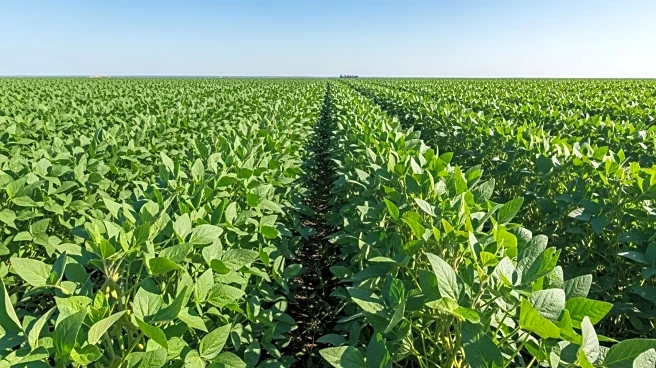What's Happening?
Brazil is set to achieve a record in soybean exports, reaching 102.2 million tons by the end of October, surpassing previous annual volumes. This surge is largely due to the absence of U.S. competitors in the Chinese market, as reported by the grain exporter group Anec. Brazil, the largest global producer and exporter of soybeans, has harvested a record crop exceeding 170 million tons in 2025. The strong demand from China, which is engaged in a tariff war with the U.S., is driving this export growth. In September, China imported 6.5 million tons from Brazil, accounting for 93% of Brazil's total soybean exports. Anec projects that Brazil will export 110 million tons of soybeans in the current calendar year.
Why It's Important?
The shift in soybean exports highlights the impact of geopolitical tensions on global trade patterns. With the U.S. absent from the Chinese market, Brazil has capitalized on the opportunity to increase its market share. This development underscores the strategic importance of agricultural exports in international trade and the potential economic benefits for Brazil. For the U.S., the absence from the Chinese market represents a significant loss in potential revenue and market influence. The situation may prompt U.S. policymakers to reconsider trade strategies and address tariff-related challenges to regain competitiveness in the global agricultural sector.
What's Next?
Brazil's continued dominance in soybean exports to China may lead to further strengthening of trade relations between the two countries. As Brazil solidifies its position as a key supplier, the U.S. may face increased pressure to resolve trade disputes and re-enter the Chinese market. The ongoing tariff war could influence future negotiations and trade agreements, potentially reshaping the landscape of global agricultural trade. Stakeholders in the U.S. agricultural sector may advocate for policy changes to enhance competitiveness and mitigate the impact of lost market opportunities.
Beyond the Headlines
The reliance on Brazil for soybean supplies by China could have long-term implications for global agricultural trade dynamics. This shift may encourage other countries to diversify their supply sources, potentially leading to increased competition and innovation in the agricultural sector. Additionally, the environmental impact of large-scale soybean production in Brazil, including deforestation and biodiversity loss, may attract scrutiny from environmental groups and influence future trade policies.








